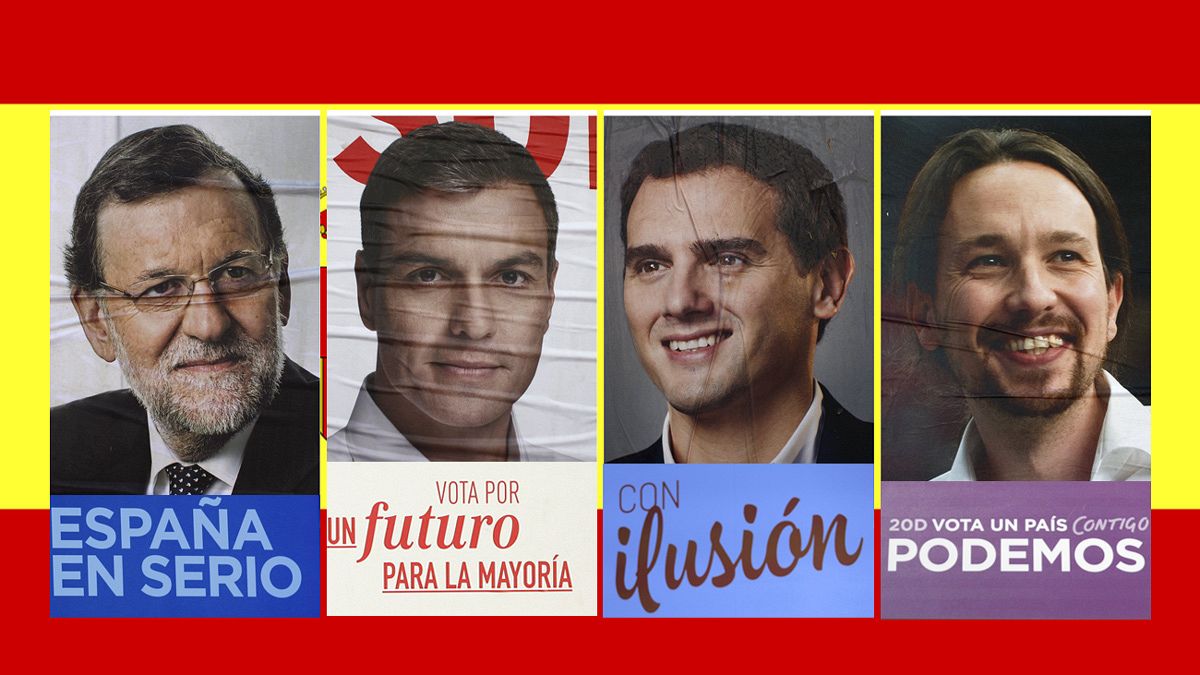When does it happen, how does it work? On December 20, 36.5 million voters will vote to renew the Congreso de los Diputados (lower chamber, 350
When does it happen, how does it work?
On December 20, 36.5 million voters will vote to renew the Congreso de los Diputados (lower chamber, 350 seats) and the Senate (208 seats). Both chambers will vote for the Presidente del Gobierno, the Spanish Prime Minister.
The official campaign started on Friday December 4 and runs until Saturday 19, when campaigns must stop.
The latest polls give a clear advantage to the ruling Partido Popular but it also seems clear that they won’t get the 176 seats needed to win an absolute majority.
Who are the candidates?
Partido Popular
.
marianorajoy</a> Hay que andar con mucho cuidado a la hora de ver a quién se vota<a href="https://t.co/xtetGI72eI">https://t.co/xtetGI72eI</a> <a href="https://twitter.com/hashtag/VotaEnSerio?src=hash">#VotaEnSerio</a> <a href="https://t.co/Ys7MHTG1PB">pic.twitter.com/Ys7MHTG1PB</a></p>— Partido Popular (PPopular) diciembre 13, 2015
Candidate: Mariano Rajoy (current Prime Minister)
The conservative party is campaigning around the achievements of its last four years in government. With the slogan #VotaEnSerio (vote seriously), it wants to highlight that it is the “serious” alternative compared with new parties like Podemos or Ciudadanos.
In their programme they propose concrete measures targetting unemployment (promising 20 million active workers compared to 18.4 million today) and more permanent contracts (through incentives for employers). PP promises to cut down some key tax rates to promote savings for the middle income and avoid tax evasion by the wealthiest taxpayers.
PSOE – Partido Socialista Obrero Español
Este es el voto que hará que recuperemos los derechos de la ciudadanía. No votar #PSOE es votar PP. #VotaPSOEpic.twitter.com/qJ1NZliPx0
— Pedro Sánchez (@sanchezcastejon) diciembre 13, 2015
Candidate: Pedro Sánchez
The centre-left Socialist Party has promised to reverse job market reforms approved by the PP that —they say— has harmed job security. They promise that Unions will set dismissal compensation, and have pledged to cut temporary employment.
They promise not to raise taxes on the middle classes and propose a “solidarity social tax” to fund pensions.
Ciudadanos
15.000 personas en streaming, llenazo con 11.000 personas y TT mundial. La ilusión vence al miedo #VistalegreNaranjapic.twitter.com/7JoQ3HWkUA
— Ciudadanos Andalucía (@Cs_Andalucia) diciembre 13, 2015
Candidate: Albert Rivera
Ciudadanos (center, liberal) is the rising star of the election, up to 19% in the polls from 11% last July.
They have proposed a “single permanent contract” with growing dismissal compensation and a supplementary bonus to those earning less than a minimum yearly salary. Rivera has called for the beginning of a new chapter of reforms in Spain, a “second Transition” (the first followed the collapse of Franco’s regime).
They have backed a “progressive” tax reform with cuts for all taxpayers and a “single corporate tax” of 20% of revenue.
This new party claims to be a “clean alternative” to the “old parties” which have been embroiled in numerous corruption scandals.
Podemos
En el bus de campaña respondiendo a las preguntas que me habéis planteado en
osoigocom</a>. Mañana en <a href="https://twitter.com/ElHuffPost">ElHuffPostpic.twitter.com/JUqXIgjrWB— Pablo Iglesias (@Pablo_Iglesias_) diciembre 4, 2015
Candidate: Pablo Iglesias
The “indignados” party has lost momentum in the polls since its emergence onto the political scene at last year’s European elections. After the success of the local elections, they haven’t managed to build “unity” agreements to form wide coalitions, as they had managed when they claimed power in Madrid and Barcelona City Halls.
They are pushing for a rise in the minimum wage (currently 648.6 euros a month), favour specific collective agreements for each industry and generally more protection for workers.
They want to force companies to get Government approval before making redundancies.
Iglesias has promised an aggressive tax rise on “the rich” that would increase state revenue by €92 billion. These higher taxes would apply to those earning more than 60.000 euros/ year. Taxpayers declaring more than 300,000 euros revenue would be taxed at 55%. They also want to raise VAT to 25% on “luxury goods” but they haven’t specified which.
What are the big issues?
Reduce unemployment, maintain or enhance welfare support
Creating employment is a “National Emergency” for all candidates with unemployment stuck above 20% of the labour force (currently 21.18%) since 2010. The second part of the equation is the balance between austerity measures to tackle the economic crisis and spending on welfare.
The parties propose different alternatives to maintain the quality of essential public services while limiting of eliminating the need for tax rises. Jobless figures and tax income are partly distorted by tax fraud and “informal economy” practices (calculated at 25% of GDP, meaning 235 billion euros arenot declared).
A hard fight…for second place
This election could end up with the traditional two party political setup (PSOE + PP) in place since the restoration of democracy in 1977.
The old and the new parties will have to set up deals with each other to form a government after the Sunday December 20 election. Most governments since the democratic transition have ruled with an absolute majority or relied on other parties for just a small amount of seats. This could be the first time a real split happens.
The Popular Party leads in every poll so the key is the race for second place.
Outgoing Parliament
Latest Poll
Catalan independence
The Catalonian Independence issue has erupted a few weeks before the national election as a result of the Catalan early regional election. The new regional Parliament has approved a “shutdown process” to split from Spain.
Constitutional reform
All of the parties seem open to considering constitutional reform during the next term but no one seems to agree on the extent and scope.
